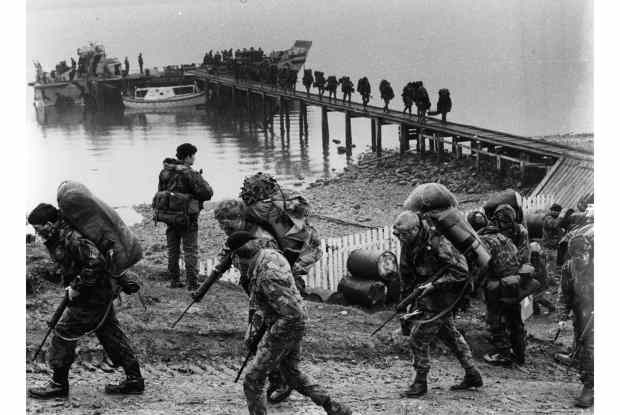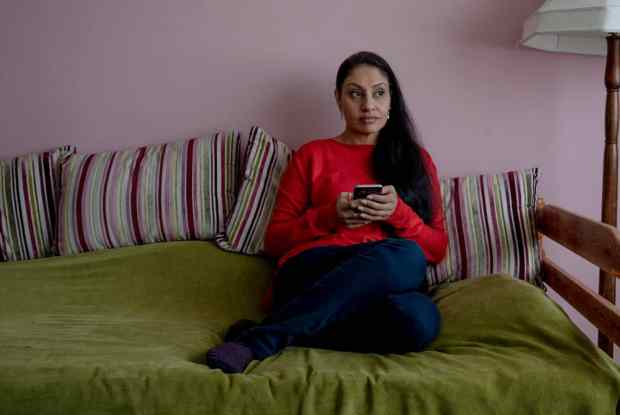With theatres shut, radio must lighten the darkness. The Guilty Feminist is a wildly popular podcast performed by Deborah Frances-White and guests. In the episode of 23 March, the presenter hoped the superbug would cure our mania for business trips to ‘Philadelphia for a meeting about key performance indicators… Don’t fly to see people you hate. Fly to see people you love.’ She was probably unwise to dabble in medical predictions. ‘I hope Boris catches coronavirus so badly he needs to be sequestered on a desert island with no loo roll.’
Her co-presenter, Sindhu Vee, mocked her children’s frailties and her own. One of her young daughters announced her intention to become a feminist lawyer while the other said she wanted to be a mermaid. ‘I high-fived the one who wanted to be a mermaid.’ Preceding the hour-long podcast came an appeal for cash. Frances-White begged listeners to send her £2.50 per month so she can carry on ‘making lemonade out of patriarchal lemons’. The advert laid it on thick. ‘It’s been an unqualified blessing,’ she oozed, ‘performing, learning, laughing and growing.’ The appeal went on for four solid minutes which made it one of the longest advertisements I’ve ever sat through.
And there lies the key difference between radio and live theatre. There’s no instant feedback on radio, no umbilical connection between performer and audience. On stage, an actor can see which playgoers are fidgeting, yawning, texting or dozing. And it’s obvious, after the interval, how many of the audience have failed to return. Radio lacks these important cues and it leads to ill-discipline and self-indulgence.
A lot of people recommended a political satire, Capital, about a team of bungling civil servants trying to implement a referendum decision to reintroduce the death penalty. It’s a decent idea for a ten-minute sketch which might, just about, become a full-length play. ButCapital has been spun out to six episodes lasting a total of four hours and 20 minutes. Even if you’re only half-listening that’s two hours and ten minutes. My patience expired before the end of episode one.
Similar difficulties afflicted The Blackrock Girl, a comedy thriller that occupied two afternoons on Radio 4. Residents in an Irish village are excited by the arrival of Theresa Finn, a charming nurse, who claims to have made a fortune working in hospitals in Africa. She catches the eye of Charles, an eccentric English history professor (apparently every village in Ireland has one), who lives in a hovel unconnected to the electricity grid. ‘I get a spring clean every 20 years whether the house needs it or not,’ he says. Theresa learns that Charles is rich. ‘I’d love a nose through your library,’ she purrs. When he quotes Latin she swoons in ecstasy. ‘Oh Charles. Shall I drape myself in a toga?’ It takes 45 minutes to set up this creaky romance. The remaining 45 minutes involve a valuable painting and a comic-book swindle devised by Theresa. Her blatant fibs are swallowed by everyone in the village apart from Martin Martin (yes that’s his name), who happens to be a retired detective.
Aside from its slow-footed narrative, the play has two pivotal moments that are hostile to radio. Keen to impress Theresa, Charles transforms himself from a hairy-nostrilled loner into a fashionably groomed ladies’ man. But the conversion is explained to us through the gossip of his pals in the pub. Likewise, when the valuable painting arrives its ugliness has to be conveyed by the postmistress and her friend offering lukewarm compliments. On stage or screen, both scenes would be funny. On air, they’re clumsy and laborious. The play left me wondering if Radio 4 believes its audiences are fully engaged with the medium.
Selected Shorts is a performance of short stories recorded at New York’s Symphony Space. The episode entitled ‘O. Henry at 100’ featured a harrowing yarn, ‘The American Embassy’, by Chimamanda Ngozi Adichie. A bereaved mother queues outside the US embassy in Lagos, hoping to claim asylum in America. Her family have been persecuted by armed thugs and her young son has died. It’s clear she’s a deserving case but the embassy’s helpful staff have no such guarantees. They ask for proof of the mother’s statements and she’s outraged by this apparent injustice. The piece’s emotional impact is marred by the narrator’s weird expectation that American diplomats should hand out US residency permits on demand, worldwide.
‘My Father Sits In The Dark’, by Jerome Weidman, is an oblique literary oddity, a story about nothing, written in 1935. A young man is intrigued by his 53-year-old father’s habit of smoking his pipe alone in the evenings. He’s determined to find out what lies behind these solitary interludes. His father answers his questions kindly and attentively, giving nothing away. The story ends with a beautifully inconclusive conclusion.
Got something to add? Join the discussion and comment below.
Get 10 issues for just $10
Subscribe to The Spectator Australia today for the next 10 magazine issues, plus full online access, for just $10.
You might disagree with half of it, but you’ll enjoy reading all of it. Try your first month for free, then just $2 a week for the remainder of your first year.














Comments
Don't miss out
Join the conversation with other Spectator Australia readers. Subscribe to leave a comment.
SUBSCRIBEAlready a subscriber? Log in